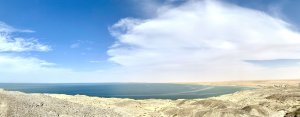
Integrating climate change into all public policies; improving the environmental information system, compliance, surface and groundwater monitoring and biodiversity; enforcing the law on environmental, waste and chemicals management; and stepping up efforts for the sustainable management of fisheries, energy and mining activities are the main priorities identified in Mauritania's Environmental Performance Review, presented today in Nouakchott.
The review provides recommendations to guide the Mauritanian Government's actions aimed at achieving the Sustainable Development Goals, as well as national commitments in terms of sustainable development and environmental management.
Improvements in environmental governance
The country is gradually equipping itself with tools and mechanisms to support environmental management. Created in 2021, the Environmental Police has administrative and judicial police powers, which it enforces throughout the country for all offences relating to environmental regulations, including in protected areas, national parks and free zones. It thus provides important support to the Ministry of the Environment.
However, the unsystematic integration of climate change into sectoral policies remains a major challenge for the country. The Government has taken a series of measures to put in place the institutional structures needed to promote, coordinate and strengthen its efforts to adapt to climate change and mitigate its effects. These measures include the creation of working groups composed of sectoral focal points, representatives of civil society and the private sector, and networks of independent experts; the preparation of comprehensive national communications of greenhouse gas inventories; and the preparation of biennial reports, as requested by the UNFCCC. The Ministry in charge of the environment has set up a department dedicated to the climate and the green economy.
Improving the protection of fisheries resources
Mauritania has abundant fishery resources thanks to a rich ecosystem that is among the most productive in the world. National parks such as Banc d'Arguin and Diawling protect this ecosystem from pollution and prevent over-exploitation of marine species. Nevertheless, fishery resources remain generally overexploited. One of the causes of overfishing is the production of fishmeal, which deprives the population of cheap fish and compromises food security. In order to ensure that the Government's efforts in terms of transparency and good governance of marine fisheries are visible to national and international stakeholders, Mauritania became a candidate country for the Fisheries Transparency Initiative in 2018. The review suggests raising public awareness of the need to tackle marine pollution caused by plastic discharges and to better protect the country's fisheries resources.
Preventing pollution linked to mining
Mauritania is endowed with a wealth of mineral resources. The mining sector accounts for 24.2% of GDP, and almost 5.5% of the population benefits indirectly from the artisanal mining sector. Nevertheless, activities in this field, particularly those linked to artisanal gold mining, give rise to environmental and public health problems. Artisanal mines use mercury and cyanide to extract gold, polluting the water, soil and air, and affecting the health of workers, as well as people living near the mines. The review recommends that the Government require an environmental and social impact assessment to be carried out for the establishment of new gold ore processing centres and new artisanal mining zones. In addition, the review recommends that the Government examine the possibility of establishing a national system for classifying and managing the country's mineral resources using the methodologies and approaches recommended by the United Nations Framework Classification for Resources and the United Nations Resource Management System.
Promoting the development of renewable energy
Thanks to its geographical location, Mauritania has high solar and wind energy potential. The ongoing projects will expand renewable energy production, which already accounted for around 37% of the country's total energy production in 2022. Despite this, almost 80% of the country's electricity comes from thermal power plants using heavy fuel oil, one of the most polluting fossil fuels. These plants are a major source of greenhouse gas emissions and air pollution (the combustion of heavy fuel oil emits sulfur particles), as well as water and groundwater contamination in the event of accidental spills. Epidemiological studies have suggested a connection between heavy fuel oil combustion particulate matter and mortality as well as morbidity. The review suggests that the Government should speed up the transition to renewable energy sources, such as solar, wind, biomass and small hydroelectric power stations, which would have the added benefits of strengthening energy independence and improving the country's balance of trade, as heavy fuel oil is imported.
Note to editors
The Environmental Performance Review of Mauritania was possible thanks to the support of France and Germany, as well as the United Nations Economic Commission for Africa, which provided the services of their experts for its preparation. Estonia, Georgia, Germany, Italy, Montenegro, Romania and Switzerland participated in the Environmental Performance Review Expert Group. Austria, Germany and Switzerland support the Environmental Performance Review programme.